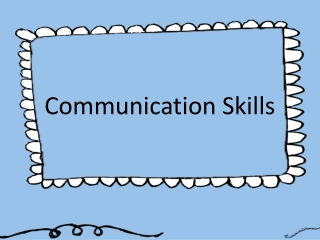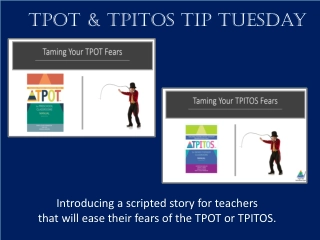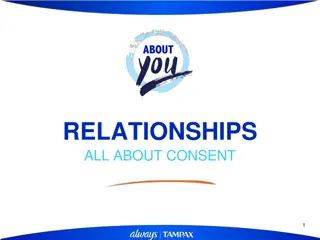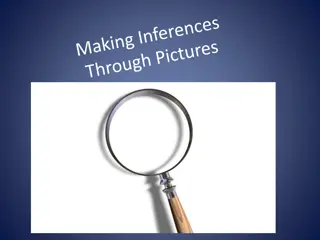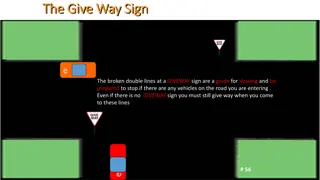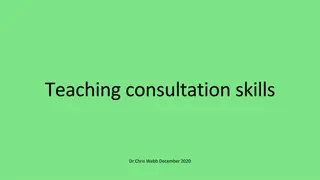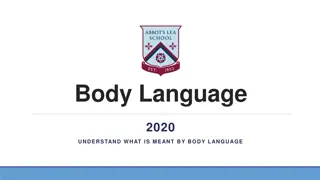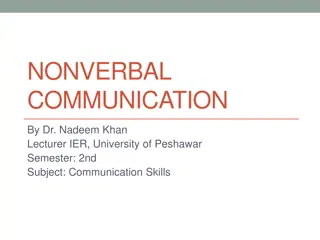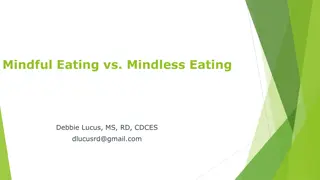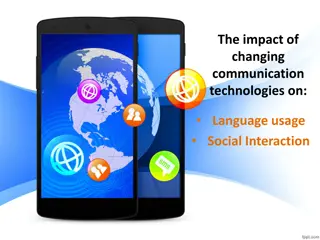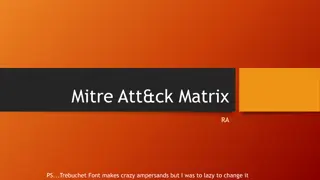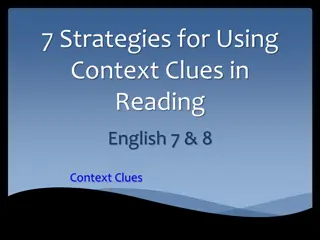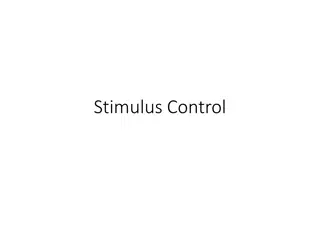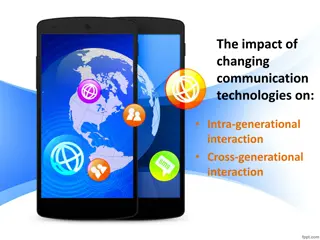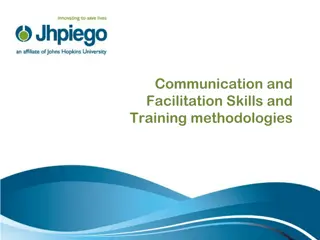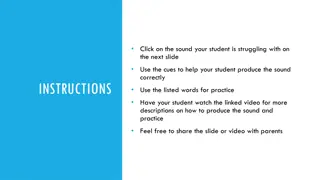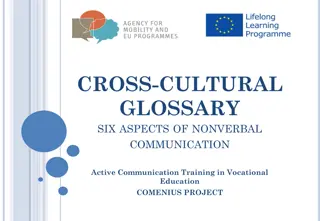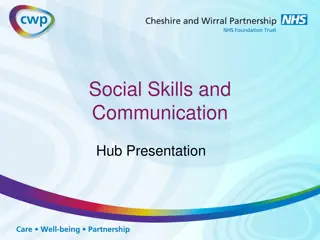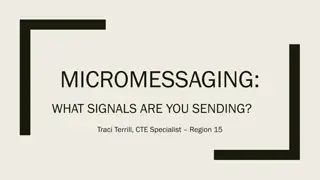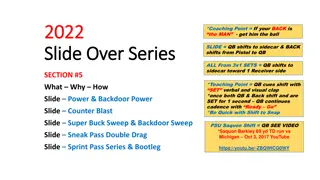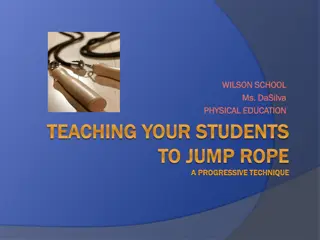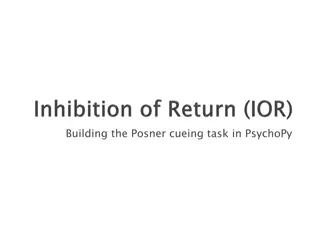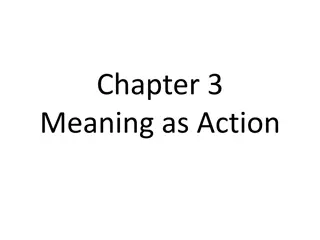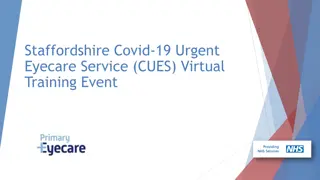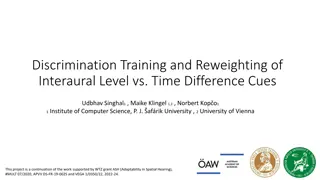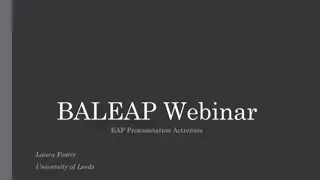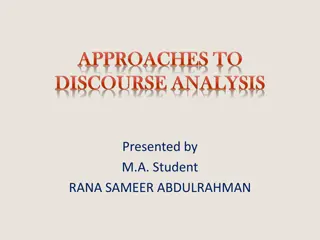Mastering Communication Skills: Essential Techniques
Enhance your communication skills through understanding types of communication, practicing the POP technique, and using verbal and nonverbal cues effectively. Improve your ability to convey messages clearly and make a positive impact.
1 views • 22 slides
TPOT & TPITOS tip Tuesday
Empower teachers with practical tips to navigate TPOT and TPITOS assessments smoothly. The scripted stories offer strategies to increase child engagement, ease transitions, and foster social and emotional skills in toddlers. From offering choices during snack time to providing visual cues for transi
0 views • 24 slides
Mastering Effective Communication in the Workplace
Explore the significance of effective communication, various communication preferences, and strategies to enhance communication dynamics. Dive into non-verbal cues, listening skills, and overcoming barriers to communication. Understand the impact of different communication channels and how to engage
12 views • 40 slides
Is regressive voice assimilation a mirage?
Delve into the discussion on regressive voice assimilation, challenging traditional views of laryngeal phonology. Explore the intricate phonetic cues and contrasts that go beyond Voice Onset Time (VOT), examining the complexities of active [-voice] in voicing languages. Discover the prevalence of re
2 views • 28 slides
RELATIONSHIPS. ALL ABOUT CONSENT
Explore the meaning of consent, strategies for giving or seeking consent, and real-life examples in relationships. The lesson covers defining consent, respecting boundaries, and communication skills. Learn about the legal definition of consent and how to navigate consent using language and body cues
0 views • 29 slides
Understanding Facts and Opinions in Reading Comprehension
Reading comprehension involves distinguishing between facts and opinions in a text. Facts can be objectively proven, while opinions are subjective reflections of personal feelings. Recognizing the difference is crucial for essay writing and critical analysis. By examining cues and asking specific qu
2 views • 9 slides
Effective Communication Skills for Improved Interaction
Enhance your communication skills with tips like being an attentive listener, using clear language, leveraging non-verbal cues, and showing empathy. Learn how stress and anxiety can hinder effective communication and the importance of feedback. Developed by K. Syed Abthaheer, this resource emphasize
0 views • 10 slides
Analyzing Inferences from Visual Cues
Explore a series of visual scenarios and make inferences about the individuals depicted based on their grocery lists, interactions, activities, and emotions. From discerning personal habits to predicting future events, each image provides a unique context for observation and deduction.
0 views • 57 slides
Exploring Weather through Infrared Temperature Detection
Studying everyday weather using infrared temperature detection from the environment can help in understanding the relationship between temperature variations of different objects and weather conditions. This activity involves creating hypotheses and testing them using an infrared temperature sensor.
0 views • 20 slides
Road Traffic Signs and Markings Overview
Understanding road traffic signs and markings is crucial for safe driving. From Give Way signs to double solid lines, each element serves a specific purpose to regulate traffic flow and ensure road safety. This comprehensive guide breaks down the meaning and importance of various road markings such
0 views • 15 slides
Effective Communication Skills for Healthcare Professionals
Enhance your communication skills with the Accelerated Preceptorship Communication Session by Desiree Cox. Learn the importance of effective communication, different communication preferences, communication dynamics, non-verbal communication, listening skills, and more. Understand the communication
2 views • 28 slides
Mastering Consultation Skills for Effective Patient Care
Enhance your consultation skills by learning how to open a consultation, understand the patient's psycho-social context, identify cues, develop diagnostic hypotheses, rule out serious conditions, and conduct appropriate examinations and tests for comprehensive patient care.
0 views • 108 slides
Understanding Body Language: A Comprehensive Guide
Body language is a form of nonverbal communication that involves physical behaviors to convey information. This includes facial expressions, body posture, gestures, eye movement, touch, and use of space. Understanding and interpreting body language involves analyzing aspects like eye contact, facial
1 views • 15 slides
Understanding the Importance of Nonverbal Communication in Communication Skills
Nonverbal communication plays a crucial role in conveying messages and signals through platforms like eye contact, facial expressions, gestures, posture, and spatial distance. It includes appearance, body language, silence, time, and space. This form of communication can significantly impact the rec
0 views • 16 slides
Insights into Mindful vs. Mindless Eating Behaviors
Understanding the contrast between mindful and mindless eating through real-life scenarios and experiments reveals how external cues, portion sizes, and presentation influence our eating habits and perception of food. From unknowingly refilling soup bowls to pouring more liquid into certain glass sh
0 views • 25 slides
The Impact of Changing Communication Technologies on Language Usage and Social Interaction
Technology has revolutionized the way communication is conducted, altering language usage and social interactions significantly. From the evolution of written communication to the emergence of emojis and new grammar structures in texts, the impact of technology on language is profound. Social media
0 views • 10 slides
Exploring Att&ck Matrix: Engage Ludicrous Speed
Dive into the world of the Mitre Att&ck Matrix, where crazy ampersands and Trebuchet Font cues you in on how to engage Ludicrous Speed and understand the basics of attacker/adversary tactics, techniques, and common use cases. Explore matrices, prevent attacks, and work programmatically with Att&ck u
0 views • 26 slides
Enhancing Reading Comprehension with Context Clues Strategies
Improve your English reading skills by mastering strategies for using context clues, word parts, definitions, synonyms, and examples. Learn how to break down words, identify prefixes and suffixes, find synonyms, and use contextual information to determine meaning. Enhance your understanding of texts
0 views • 19 slides
Understanding Stimulus Control in Behavior
Behavior under stimulus control means its occurrence is influenced by the presence of certain stimuli. This principle explains how the likelihood of a behavior happening depends on specific cues in the environment. When a behavior is under stimulus control, it is more likely to occur in the presence
6 views • 56 slides
Understanding Emotional Intelligence: Key Principles and Skills
Emotional intelligence, as presented by David Taylor, is crucial in perceiving, understanding, and managing emotions in oneself and others. It plays a vital role in professional and personal relationships by enhancing emotional awareness, recognition, and management. The principles of emotional inte
1 views • 22 slides
Supporting Children in Understanding the Coronavirus
Openly discussing the coronavirus with children is essential to alleviate worries and provide accurate information. Parents should filter news, offer developmentally appropriate responses, and take cues from children's questions. It's crucial to manage parental anxiety, reassure children about the v
1 views • 12 slides
Interactive Biomolecules Review Activity
Engage in an interactive biomolecules review where you must identify different biomolecules - carbohydrates, proteins, lipids, and nucleic acids - based on visual cues. Hold up the correct card when prompted for each biomolecule to test your knowledge and understanding of these essential compounds.
0 views • 43 slides
Understanding Stimulus Control in Behavior
Stimulus control refers to the influence of stimuli on behavior. When a behavior is under stimulus control, it occurs in the presence of certain stimuli and not in their absence. This concept is crucial in understanding how behaviors are triggered and maintained based on the presence or absence of s
2 views • 56 slides
Enhancing Cross-Cultural Communication: Strategies for Success
Explore the impact of cultural and linguistic differences on communication in this webinar, focusing on preparing English language learners to communicate effectively across cultures. Learn about a cross-cultural incident and discover elements of culture and communication, including nonverbal cues.
0 views • 37 slides
The Impact of Changing Communication Technologies on Inter-generational Interaction
The evolution of communication technologies has influenced intra-generational and cross-generational interactions. With increased use of mobile devices, younger generations tend to multitask and may not always focus on face-to-face conversations, impacting non-verbal cues. Social norms have shifted
0 views • 6 slides
Enhancing Communication and Facilitation Skills in Training
Explore the vital aspects of communication and facilitation skills in training sessions. Learn to effectively convey information, identify verbal and non-verbal cues, and foster interpersonal communication. Discover the role of a training facilitator in maximizing learning outcomes through tailored
0 views • 13 slides
Speech Sound Practice for Students
Improve speech sounds with practice words and helpful cues. Practice making sounds such as P, B, T, D, W, and H following specific guidelines. Watch linked videos for detailed instructions. Share resources with parents for continued practice.
0 views • 26 slides
Dietary Recommendations for Weight Loss in Type 2 Diabetes
Dietary recommendations for overweight and obese individuals with type 2 diabetes aim to facilitate weight loss through calorie calculation, daily weighing, and structured eating patterns. Emphasis is placed on consuming at least 1200 kcal per day, avoiding meal skipping, and monitoring food intake
0 views • 18 slides
Cross-Cultural Aspects of Nonverbal Communication in Vocational Education
Explore the six aspects of nonverbal communication in vocational education across partner countries like Poland, Turkey, France, Romania, Bulgaria, Italy, and Croatia. Discover similarities and differences in appearance, posture, haptics, gestures, eye contact, and proxemics. Delve into cultural pra
1 views • 33 slides
Enhancing Social Skills and Communication Abilities
This presentation focuses on improving social skills and communication, including non-verbal cues, body language, and eye contact. It highlights the importance of understanding social situations and provides insights on navigating interactions effectively. The session offers practical tips for indiv
0 views • 35 slides
Understanding Micromessaging: Hidden Impact of Subtle Behaviors
Micromessaging refers to the subtle, semi-conscious messages we send through our behaviors, both verbal and physical, that influence our interactions with others. These messages, categorized as micro-affirmations and micro-inequities, can have a significant impact on individuals. The concept delves
1 views • 17 slides
Duane Wolf Attack Simulation Study: Insights for Law Enforcement Officers
Duane Wolf conducted an attack simulation study to test the speed at which an un-handcuffed suspect sitting on a curb can launch an attack on officers. The study involved volunteers in different leg positions to mimic real-life scenarios. Findings emphasized the importance of officers staying alert
0 views • 9 slides
Advanced Offensive Football Strategies: Slide Over Series Coaching Points
Detailed overview of the Slide Over Series in football coaching, emphasizing strategies to get the ball to key players efficiently. Includes insights on QB and back shifts, coaching cues, Ken & Derek Leonard's success, and importance of evolving quality concepts. Learn about the process, signals, pr
0 views • 11 slides
Progressive Technique for Jumping Rope: Step-by-Step Guide
Learn how to jump rope with a progressive technique through clear steps, from mastering the basics like popping and turning the rope to adding in bounces for seamless jumping. Important cues and images included for proper form and coordination.
2 views • 13 slides
Building the Posner Cueing Task in PsychoPy
Learn how to create the Posner cueing task in PsychoPy for psychological research. The task involves presenting cues, targets, and response options in a precise sequence to study attentional processes. By following detailed instructions, you can build the task with fixation points, cues, targets, an
0 views • 8 slides
Understanding Meaning in Cultural Contexts through Action
Explore the importance of context in understanding meaning in different cultures and situations, focusing on structures of expectation, frames, contextualization cues, situated inferences, pragmatic coherence, and the cooperative principle in communication. Gain insights into how language users inte
0 views • 8 slides
Staffordshire CUES Virtual Training Event Overview
Explore the highlights of the Staffordshire Covid-19 Urgent Eyecare Service (CUES) Virtual Training Event, featuring introductions, covered CCG areas, service fees, OCT assessments, and imaging procedures within CUES to enhance eyecare delivery. Learn about the key aspects discussed by experts and h
0 views • 58 slides
Discrimination Training and Reweighting of Interaural Cues
This project focuses on discrimination training and reweighting of interaural level vs. time difference cues in normal-hearing listeners for sound localization. It explores the dominant cues at different frequencies and factors influencing binaural cue weighting. The study aims to reweight these cue
1 views • 15 slides
Effective Pronunciation Activities for EAP Learners
Explore innovative pronunciation activities for EAP learners focusing on diphthongs and nuclear stress. Discover strategies to contrast sounds across languages, provide visual cues, and integrate nuclear stress training into assessment preparation. Utilize methods like correction through non-verbal
0 views • 8 slides
Analysis of Discourse Styles in Therapeutic Conversations by Labov and Fanshel
Labov and Fanshel's non-critical approach to discourse analysis focuses on the heterogeneity of conversation styles, emphasizing shifts between frames and the importance of paralinguistic cues in therapeutic discourse. They identify different styles associated with various frames, such as interview
0 views • 14 slides
